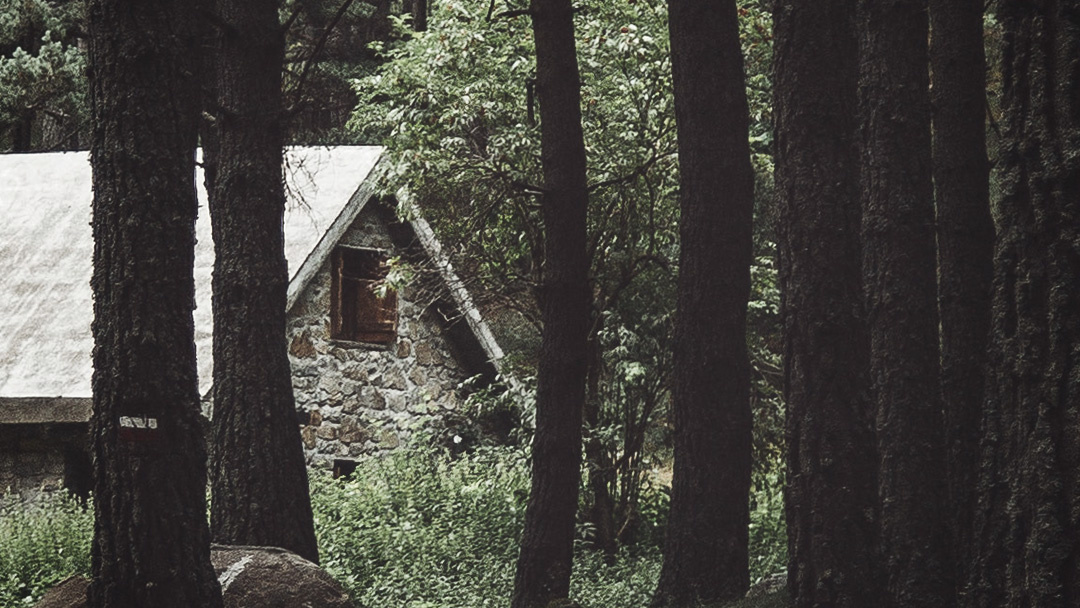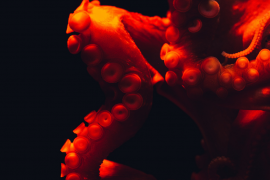The day the bat burns I get my first two-piece swimsuit. It’s orange and flowered with a white trim. It’s from Goodwill and the bottoms are too big, but my mother shows me how to tie up the excess with a hair band, bunching the fabric into a fleshy knob at my hip. I will grow into it, and besides, it matches June’s. June is not as pleased.
The bat has been flying loose in the little cabin behind the house. Momma told us not to get too close until she gets home from the store. Stay inside. Or go down to the beach! It’s as nice a day as any. But Tommy wants that bat, and if there’s a show, we’re going to watch.
Tommy grabs an old soup pot from the cupboard next to the fridge. I take the oven mitts from the kitchen because June said it might be rabid. It must be sick, she said. Bats don’t fly during the day, they’re not turnal. Turnal animals are during the daylight hours. Like bears and the little sand toads we try to catch in the road. So I get the oven mitts in case the bat tries to bite at Tommy’s wrists. I pick the floral ones thinking that the bright colors might scare it away from his grasp.
Outside the little cabin, no bigger than the two a-frame beds it holds, I drop the oven mitts at Tommy’s feet. June has toy heart sunglasses covering her eyes, a twist of green craft string tied to the bridge of the nose. She pushes them to balance on top of her head, reaching up to touch them like rosary beads.
Tommy puts the oven mitts on and hoists the pot into the air. His hands are clumsy with the extra fabric. He looks to us for a moment, his eyes a salute, then disappears behind the old wooden door. We pull it tight behind him making sure the bat can’t get out while he’s not looking. We want a fair fight.
We watch him through the sections of the window split clear from the curtains. More clear than boy and bat are the long shadows cast behind by the late afternoon sun. They move like puppets pulled wildly from strings in the rafters. June sings a carnival song and I clap my hands. We are the circus.
The window we peer through throws Tommy into a rectangle of summer sun, casting a glow to his white t-shirt and setting the tips of his hair into a sharp shine. He is the clown. He hurdles onto the beds and over the couch. The oven mitts make him clumsier, waffling the pot between his hands. He turns back to us, miming a fumbled pass of the pot. Maybe later we will play catch on the beach. I pull at the swimsuit nob at my side.
He corners the bat in the crooked angle between ceiling and wall, covering it with the dark iron of the pot and angling the lid over it inch by inch. We applaud when he emerges from the cabin; the day is won. In his hands, the potted bat is like a patch of shadow he wields into the sun soaked grass, a reversed Prometheus. The victory is held in his live-wire eyes, collapsed into their dark orbs.
He sets the soup pot down and June puts a small branch over the lid for good measure. The bat thumps against the lid. It throws itself against the confines of the pot, wings flapping hazardously with dull scraping thuds.
What now, what now, what now?
Tommy motions for us to watch it while he runs back inside the house. There is something he must get. We’ll see. June touches the sunglasses balanced on top of her head.
When Tommy returns, the oven mitts are gone. He must have tossed them back in the kitchen. Instead, in his left hand he has the lighter fluid, and in his right the Zippo that we found in town last week behind the gas station. June claps her hands together, I preen onto my tiptoes and wait.
The lighter isn’t working right. The spark flares and then spits itself out, dying in the breeze. The two of them lean over, trying to shield the flame with their twin bodies, hunched as conspirators. I am on the outside, my eyes wander, my attention wanes.
The trampoline in the front yard is empty. It stretches, an expanse of black mesh gathering heat like flaking ash from driftwood. I am the smallest and I never get a turn when we jockey for space after long swims. Instead, I watch as the water flies off them, beads like small fireworks bursting with reflections of the high sun. Now, their eyes are fixed on the flame, so I back out, inching towards the jump.
I nick a popsicle from the bait freezer on the side of the house, peeling off the plastic like cicada wings. I sit atop the vinyl, alone with my orange popsicle, feeling the springs like breath adjusting to my weight, up down. I let the canvas settle underneath crossed legs. The sun looming low behind me, reflecting dimly in the dark fabric. The sugar melts orange slug trails like ice down my arms.
When I think of it in the future, I will see it from inside the pot, crashing into itself, collapsing in the sudden sunspot of the lighter fluid blast. I will see it break loose, soaring out of the pot like some pentecostal omen until it is only flakes of ash and sparks, brilliant in its disappearance.
The smoke will plume high and black in my memory, but in this moment I might never look. I am content with my popsicle and the feel of hot canvas. The look of clear sky and the scream of the bat, high, high pitched. The taste of an orange popsicle.
SARAH PERRET-GOLUBOFF is a Chicago-based writer. She works for an educational non-profit, having previously been an editorial assistant at Curbside Splendor Publishing. “The Bat” is her first national publication.
Like what you’re reading?
Get new stories sent to your inbox every Monday. Drop your email below to start >>>
OR Grab a Print Issue
Stories, poems and essays in a beautifully designed magazine you can hold in your hands.
NEW book release
We’re thrilled to release our first novel into the world. Alligator Zoo-Park Magic by C.H. Hooks has been called “A new spin on the mystical, mythical south.”
GET THE BOOK



